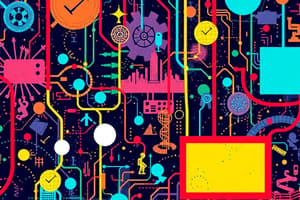Podcast
Questions and Answers
How has automation impacted labor?
How has automation impacted labor?
- Reduced productivity and efficiency
- Increased job security across all sectors
- Provided more benefits and job protections for gig workers
- Led to displacement of workers in certain sectors (correct)
What is one positive effect of the networked society on labor?
What is one positive effect of the networked society on labor?
- Limited opportunities for flexible work arrangements
- Allows individuals to work remotely and on their own schedules (correct)
- Increased job security for all workers
- Decreased efficiency in work processes
How has cloud computing influenced business models?
How has cloud computing influenced business models?
- Made business models less scalable
- Limited the flexibility of business operations
- Decreased productivity in businesses
- Enabled more flexible and scalable business models (correct)
What is a consequence of social media in the networked society?
What is a consequence of social media in the networked society?
How has technology reshaped social structures?
How has technology reshaped social structures?
What distinguishes the economic structures of a networked society from those of industrial capitalism?
What distinguishes the economic structures of a networked society from those of industrial capitalism?
How have communication networks evolved in the networked society according to the text?
How have communication networks evolved in the networked society according to the text?
What has been the primary role of technology in shaping the networked economy?
What has been the primary role of technology in shaping the networked economy?
What impact have communication networks had on labor in the networked society?
What impact have communication networks had on labor in the networked society?
How does the networked society differ from industrial capitalism in terms of social structures?
How does the networked society differ from industrial capitalism in terms of social structures?
Flashcards are hidden until you start studying
Study Notes
In the realm of contemporary human interaction, the concepts of a networked society and industrial capitalism intersect, shaping our economic, social, and technological landscapes. This article delves into these interconnected ideas, exploring their economic structures, communication networks, role of technology, and impact on labor and social structures.
Economic Structures
The networked society, built on the foundations of industrial capitalism, has witnessed a gradual transition from centralized to decentralized economic structures. Industrial capitalism historically revolved around large, dominant corporations that controlled the means of production and distribution. In contrast, a networked society embraces a more complex and interconnected array of economic actors, including smaller businesses, freelancers, and gig workers.
Communication Networks
Communication networks, a vital component of the networked society, have evolved from traditional face-to-face interactions to a globalized web of digital connections. This shift has facilitated the rapid exchange of information, goods, and services. The internet, social media, and mobile devices have allowed for the formation of loosely coupled networks, enabling individuals and organizations to collaborate and communicate across vast distances in real-time.
Role of Technology
Technology has been a driving force in the transformation of society, fueling the rise of the networked economy. From automation and the Internet of Things (IoT) to artificial intelligence and cloud computing, technology continues to reshape the way we live, work, and interact. For instance, automation has led to increased productivity and efficiency, while cloud computing has enabled more flexible and scalable business models.
Impact on Labor
The networked society has both positive and negative effects on labor. On the one hand, it has created new opportunities for flexible work arrangements, allowing individuals to work remotely and on their own schedules. On the other hand, automation has led to the displacement of workers and the erosion of job security in certain sectors. The rise of the gig economy has also presented new challenges, such as the lack of benefits and job protections for gig workers.
Social Structures
The networked society has also had a profound impact on social structures. Social media and digital networks have facilitated the formation of new communities and interest groups, often transcending traditional geographic boundaries. These networks have also allowed for the rapid spread of information, ideas, and cultural trends, leading to both positive and negative consequences. For example, social media has enabled the rapid spread of misinformation and fake news, while also providing a platform for marginalized communities to build solidarity and share their experiences.
Conclusion
The networked society, built on the foundations of industrial capitalism, has ushered in a new era of economic, social, and technological transformation. Communication networks, built on the backbone of technology, have facilitated the rapid exchange of information, goods, and services. The impact of this transformation has been felt across various sectors, as the rise of automation and the gig economy has brought about both opportunities and challenges. Ultimately, the future of the networked society and industrial capitalism will be shaped by our collective ability to navigate these complex and interconnected landscapes.
Studying That Suits You
Use AI to generate personalized quizzes and flashcards to suit your learning preferences.




